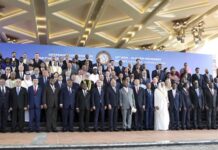The federal government has made it clear that, under its laws, any asylum seeker who risks their life to reach Australia by boat will never be permanently resettled.
This means that if the Murugappan refugee family is released from Perth community detention, they are likely to join 18,000 others on insecure temporary visas living in the community, in limbo.
Former Liberal senator Amanda Vanstone asked in a recent article: “If you were on a temporary protection visa in Australia, would you have children, knowing that there were risks involved with being allowed to stay?”
It’s not surprising that the former immigration minister, who also used to throw refugee children in detention, would stoop to victim blaming.
How shameful that people who come from positions of power and privilege are suggesting that Priya and Nades somehow brought this nightmare on themselves — that the reason their children are in detention is because they dared to have them at all?
Blaming refugees and attacking basic human rights, like the right to have children, while they are forced to wait years to hear the outcome of citizenship applications or the right to just apply for citizenship, highlights the cruel nature of temporary visas and the terrible impact they have on the refugees’ lives.
Monir Hossein, a Medevac refugee who spent eight years locked up in detention, told Green Left that living on a bridging visa is “unbelievably frustrating”. “It’s not a solution and the government needs to give a permanent solution”. Hossein has not seen his family in nine years.
Refugees who come to Australia by boat are given the lowest processing priority for family reunions.
Temporary Protection Visa (TPV) holders and Safe Haven Enterprise Visa (SHEV) holders are denied family reunions, or the right to return to Australia if they leave.
To be denied the right to travel adds to these people’s torture and is the source of a lot of depression and anxiety.
Many refugees speak of the stress of not being allowed to visit spouses, parents and children living overseas while on a TPV; they liken it to imprisonment in Australia.
Hassan Jaber from the refugee-led group Justice For Refugees Victoria and a community organiser at the Migrant Workers Centre was stateless and came to Australia in 2012 from Kuwait seeking protection. Instead, he was discriminated against.
“I did not get to see my father before he passed away,” he told Green Left. “I didn’t see my family for about 10 years. My father told me that he wanted to hug me and see me before he died. I couldn’t say goodbye to him.”
In its submission to the Senate Select Committee on Temporary Migration, the Refugee Advice and Casework Service (RACS) reported on the impact of Australia’s temporary protection regime, and highlighted the dire mental health impact for people forced to live on TPVs and SHEVs.
RACS pointed to a 2018 study that identified “prolonged uncertainty” as a contributing factor to refugees’ deteriorating mental health and despair when subject to the temporary protection scheme. RACS said it “led to at least 11 suicides since 2014 and several near misses”. The report is scheduled to be released on September 2.
Hossein, who is working in meatpacking, does not know what the future holds for him when his bridging visa expires on September 27. The uncertainty makes him “feel physically and mentally unwell”.
TPV holders are usually vulnerable to exploitation from bosses. Many people on these visas are desperate to earn money to support the families they left behind. With limited English, excluded from tertiary studies (as they would need to pay full fees up front to study here) means they are forced to take jobs that do not recognise their skills.
The Department of Home Affairs told the ABC in December that “No-one on a safe haven visa has ever gone on to permanent status”.
Jaber, who is on a SHEV, told Green Left that he “loves Australia”, but that he and others on temporary visas have faced racism and had been “threatened with deportation” several times.
“When will this end? We are not criminals but we are treated worse than criminals. You can get sent back to detention or threatened to get sent back for minor things like parking fine”.
Priya and Nades Murugappan and their children Kopika and Tharnicaa have sought protection visas since 2012. It’s been almost 10 years and they are still waiting.
The Bilo family’s temporary visas expired in 2018. That made it possible for guards to bundle the family into a van in pre-dawn raid and fly them to a detention centre before almost deporting them to Sri Lanka, a country the federal government denies is unsafe for Tamil people.
Giving them new TPVs would land the family back in the same situation they were three years ago.
The Bilo family’s deportation did not happen because an entire town of 6000 people stood up for the family, launching the #HometoBilo campaign. National protests were also organised around the country.
We must keep up the pressure on the Coalition to really show compassion by releasing all refugees from onshore and offshore detention and give them permanent protection and full rights. This is the only way they can get on with their lives without fear of deportation and be treated as equals in the workplace, at school and in the community.
– Chloe DS, a refugee rights activist in Melbourne, First appeared in greenleft.org.au





